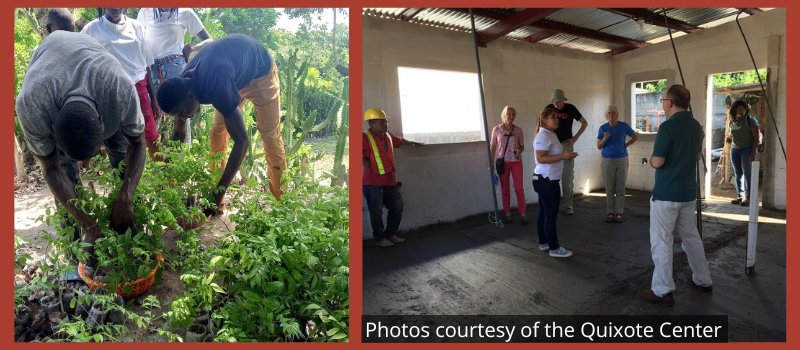In a world where oppressive systems often hold back the dreams and aspirations of many, the Quixote Center stands as a ray of hope. As an FSPA-sponsored ministry located in Greenbelt, Maryland, the Quixote Center is dedicated to advancing social justice and human rights, especially in Latin America. Motivated by the principles of liberation theology, the center launched a series of new, innovative programs aimed at tackling social and economic injustices. Since its establishment in 1976, with a vision of justice and equality, the organization has spent nearly five decades uplifting communities in some of the world’s most struggling regions. As a driving force for transformation, the Quixote Center has broken down systems of oppression and paved the way for people to shape their own futures. From Nicaragua to Panama to Haiti, their work deeply influences lives, promoting lasting solutions.
From vision to reality
The Quixote Center’s journey began in 1976, founded by Bill Callahan and Dolly Pomerleau. Their shared vision of challenging injustice, both within the Catholic Church and in society, led to the creation of an organization dedicated to supporting challenging missions. Over the years, the Quixote Center’s influence grew, with some of its prominent programs, such as the Christic Institute, New Ways Ministry, Prison Radio, Equal Justice USA, the Nicaragua Cultural Alliance and Interfaith Voices, evolving into independent organizations. Despite these changes, the Quixote Center has remained true to its founding principles, continuing
to focus on economic development and advocacy in regions like Haiti and Nicaragua, including initiatives like Haiti’s Reborn program and Nicaragua’s Quest for
Peace program. Today, the Quixote Center continues to support vulnerable communities, staying committed to its founders’ vision by working hard to achieve significant progress and making a lasting difference.
Transformative impact: The Quixote Center’s lasting contributions
The Quixote Center’s programs show its strong commitment to social justice and sustainable development. These programs continue to reflect on the center’s long-standing dedication to challenging oppressive systems and advocating for vulnerable communities. Some major programs that the Quixote Center has launched include Haiti Reborn, Quest for Peace and InAlienable, a migrant justice program at the
U.S. border.

The Quixote Center has been involved in Nicaragua since 1984 through the Quest for Peace program, launched in partnership with the Institute of John XXIII. The
program began as a stand with the Nicaraguan people during the Reagan administration’s Contra War, aiming to oppose U.S. involvement in the conflict and offer
humanitarian support to those affected by the war in the northern region of Nicaragua. As the war subsided, Quest for Peace shifted its focus to include community
development projects. A notable project, Hope for Homes, began after the reconstruction efforts following Hurricane Mitch in 1998, resulting in 200 homes built
there. These initiatives have been crucial in helping Nicaraguans gain economic independence and stability.
The Quixote Center began Haiti Reborn in 1991 during a transitional period in Haiti, marked by the election of Jean-Bertranf Aristide. In September 1991, the focus shifted to advocating for democracy in Haiti and challenging U.S. involvement. The Quixote Center’s approach in Haiti centers on three key areas: creating sustainable jobs through economic development, protecting the environment with reforestation and advocating for U.S. policies to support Haitian democracy and local solutions. In 1999 the Quixote Center expanded its work by partnering with the Montfortins and the JeanVincent Formation Center to launch a reforestation and sustainable agriculture program in Gros Morne, Haiti. One of their early projects with the Jean Marie-Vincent Center transformed the barren Tet Mon mountainside. In 1991 the mountain was untouched. Today it thrives with over 200,000 trees. Haiti, being the poorest country in Latin America, faces environmental challenges, such as deforestation threatening numerous species. The Quixote Center’s program not only focuses on planting trees but also on educating future generations about maintaining them and understanding their importance. The Quixote Center continues to fund the forest’s maintenance, making it a regional model.
InAlienable is a recent program the Quixote Center launched in 2018. The program supports migrant rights at the U.S. border and throughout their journey in the United States. It works to end immigrant detention and defend the right to seek asylum, which has become harder due to the Biden Administration’s June 4 executive order that restricts asylum rights. The Quixote Center partners with the Franciscan Network on Migration, which links shelters run by Franciscan orders
across Latin America, offering help to migrants. The Quixote Center’s ongoing work to foster justice and support vulnerable communities demonstrates their commitment to advocacy. Their impactful work is made possible by the generous support of donors. Visit quixote.org/ways-to-give to find out how you can support their mission.

